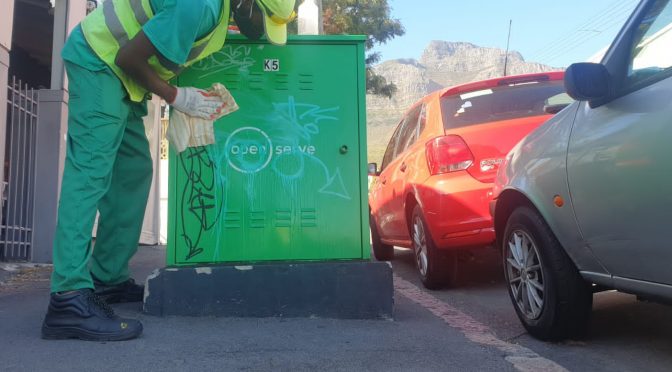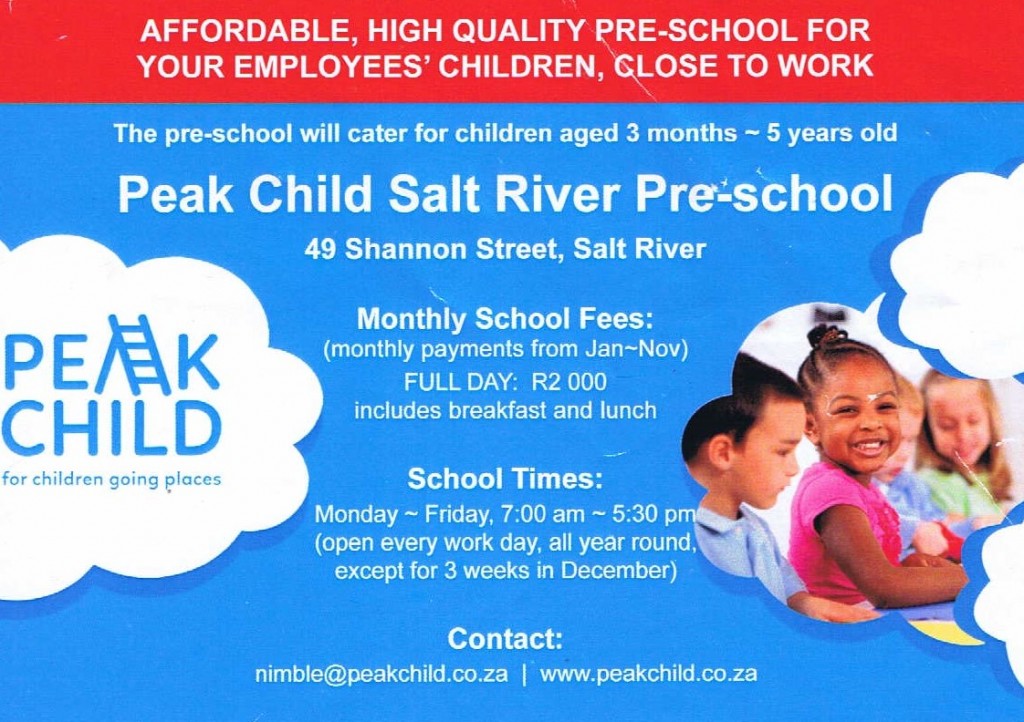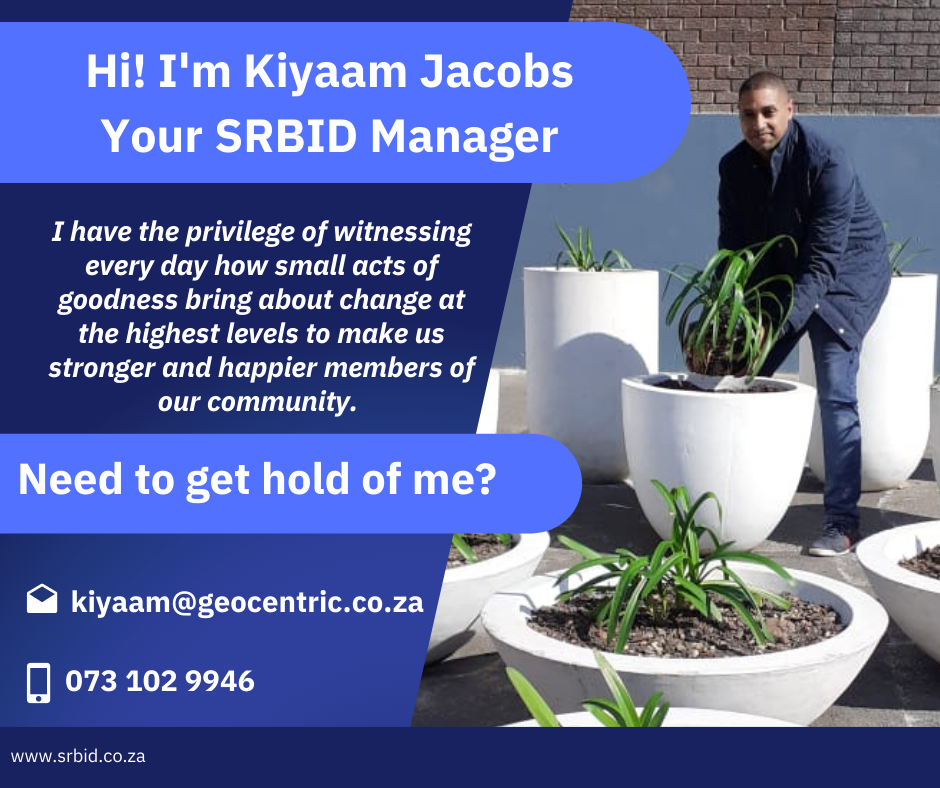
Seeing To Your Safety
Update On Our CCTV Camera Network
Crime is a sombre reality in South Africa that costs us dearly. Emotionally, living in fear drains us and financially, unplanned expenses due to theft can leave us grasping at straws. To do our part in creating a safer space for us all to share we are expanding and upgrading the CCTV camera network in the Salt River Business Improvement District (SRBID).
The expansion supports our other public safety and urban management activities by sustainably decreasing criminal activity.
In conjunction with the City of Cape Town, The SAPS, Neighbourhood Watch groups, local businesses and private individuals, we are a pivotal member of a Public Safety network with cameras that have eyesight over the critical locations of our CID.
Allowing us to see the entire Salt River Business Improvement District and intervene in all types of crimes to make our community safer.
Organized criminal activity targeting theft and vandalism of electrical components cost Eskom an estimated R69 000 000 in the last 18 months alone according to CEO Andre de Ruyter. The damages to local businesses caused by interrupted power are incalculable, especially in mixed-use and industrial areas like the SRBID.
The Salt River Business Improvement District’s road and communications infrastructure is also being crippled by vandalism and robbery, resulting in key road intersections, cell phone towers, and fibre networks being rendered inoperable.
By expanding our CCTV surveillance we hope to be a significant contributor to creating a collaborative city-wide surveillance system that will prevent, identify, and neutralise criminal activity in real-time. We also know that our systems will help lawyers bring more criminals to justice and alleviate some of the load on our judicial system as they make the conviction process clearer and quicker.
Our network is so effective due to our multifaceted approach to both the camera hardware and the data management of the surveillance systems. Our cameras are monitored on a 24/7 basis by a centralised control centre meaning we can track and stop criminal activity across districts in real-time.
Our Cameras
We use three types of cameras, some with infrared capabilities to see even in the dark.
– Pan Tilt Zoom (PTZ) cameras – These can be rotated by our trained operators to track people acting suspiciously even after they think they have walked out of frame.
– Licence Plate Recognition (LPR) cameras – These are static cameras reading licence plates of vehicles. The CID belongs to a recognised, well-organised user group that holds a database of suspicious vehicles. Our LPR software generates alerts when such vehicles enter our Improvement District and place us on high alert. Should the occupants act suspiciously we have the option of alerting the local SAPS sector patrol vehicles.
– Static cameras enabled with artificial intelligence functionality – These are static cameras and can be focused on hotspots or boundary areas such as fences. The cameras detect the movement of vehicles and people and alert our control room and patrol vehicles of such activity.
Our Data Management
- Our Artificial Intelligence Cameras and Software detects even the slightest movements which help our personnel see potentially hidden persons and suspicious activities.
- Video Analytics can be used to interpret, study and project criminal behavioural patterns which help us aid the SAPS to bring down the syndicates that are disrupting our peace.
Our expansion of the CCTV network is one example of how we are trying to make our community a more profitable business and residential node by creating holistic urban regeneration programmes.
Landlords, business owners and residents of the SRBID can expect:
- A continued effort to decrease crime.
- Targeted intervention by our public safety teams
- Improved response time
- 24/7 monitoring by our control room.
- Foot and vehicle patrol teams, law enforcement officers and the police equipped with essential live information to improve arrest rates.
- Prevention of more incidents due to the improved directing of resources.
- Reduced false reporting of incidences due to our ability to validate the claim instantly.
- Progress on creating a Unified City-Wide Public Safety Network.
We are improving our current public safety plan by:
- Surveying the entire SRBID to identify vulnerable points to inform the next extension of our CCTV network.
- Targeting public safety efforts on infrastructure crime to safeguard the continuous supply of energy, water, sanitation, communication infrastructure and access to transportation.
- Implementing mechanisms to alert our management and public safety teams to early warning signs of threats so that the distribution of our safety resources can be optimised.
The manufacturing, education, property, hospitality and public transport industries form the backbone of our community’s livelihoods. Ultimately, our goal is to protect the people and the resources of the institutions they serve within the SRBID.
Our sophisticated CCTV cameras use the latest technological advancements so we can streamline our prevention and intervention efforts and help bring criminals to justice.
With your help and investment, we step closer to a safer South Africa every day. And so many of you already do remarkable work in the Salt River Business Improvement District. We would love to hear your #GoodNews and how you are making our area a better place.
To share your story with us and stand a chance to be featured in one of our future newsletters email us at media@geocentric.co.za
If you have any safety concerns to report, please contact one of the following numbers:
· 10111 – SAPS (South African Police Services)
· 107 – City of Cape Town Disaster Management
· 021 565 0900 – Geocentric Control Room
City Improvement District By-Law & City Improvement District Policy
We believe that you are an expert in your area and have seen the positive change we can make first-hand. You know better than anyone, where our precious resources are best spent and we value your contribution in helping us plan for future projects.
The legislative structure governing much of our work in your area is up for amendment. We hope that the proposed changes of making the processes of starting and running a CID more structured will improve the efficiency of CIDs citywide.
Your suggestions on the proposed amendments to the CID by-law and City improvement district policy can be submitted online here, emailed to CityImprovement.Districts@capetown.gov.za or written to, City of Cape Town, PO Box 298, Cape Town 8000
Comments and objections may be submitted from 16 August to 15 September 2021.
Our Facade Improvement Programme- Building a Better Future
Bestselling entrepreneurial author Jim Rohn once said, “The good things we build – end up building us”. In the Salt River Business Improvement District (SRBID), our streets are no utopia, but at SRBID we are committed to collaboratively improving our community. We believe that improvement is contagious – which is why we have initiated our Facade Improvement Programme (FIP). The FIP is specifically designed to encourage businesses, like yours, to invest in the curb appeal of your premises. Knowing that we at the Salt River Business Improvement District are working to protect your property from vandalism and malicious degradation.
The FIP is part of an investment journey that we as business owners, community members, municipal bodies and the SRBID walk. Ultimately, we work to repair urban decay and improve the socio-economic environment of the Salt River Business Improvement District.
Our Facade Improvement Programme is a tool for inner-city revitalisation based on the formal processes successfully used in American cities. The protocol is well documented to restore citizens local pride, create a unique urban character, and repair the functionality of an urban area. Studies by the University of Wisconsin found that even small outlays have a positive impact on landlords, business owners and employees.
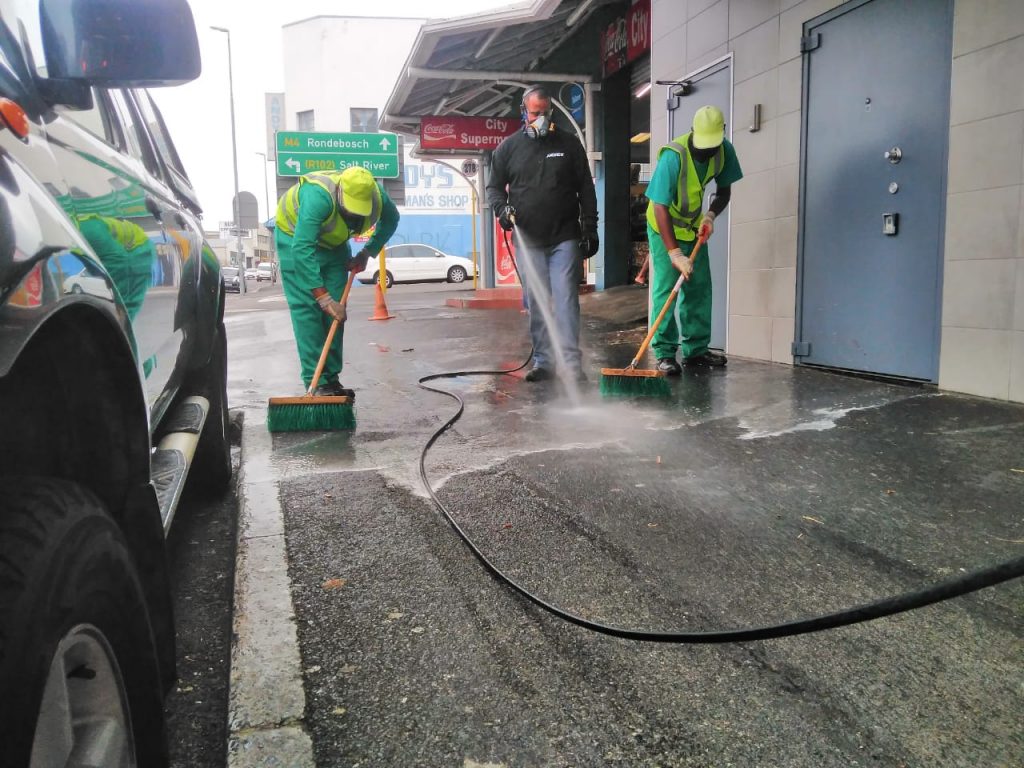
For Property Landlords Facade Improvement can:
- Generate more revenue due to new occupancy in previously unoccupied commercial spaces.
- Increase the economic return with existing renters due to facility and facade improvements.
- Improve the resale value for landlords looking to sell their property.
- Make interior improvements more cost-effective and efficient due to running the construction in conjunction.
- Grow the number of first-time customers by up to 80%.
- Improve sales by up to 90% for people with businesses in mixed-use areas.
- Provide publicity and recognition to pique the interest of new, diverse customers thereby stabilizing their income stream in times of economic instability.
- Create healthy competition by making other local businesses feel an urgency to improve their facades and facilities to maintain a competitive edge.
It’s clear that facade improvements are a catalyst for many positive changes. By attracting new customers and tenants they help inject more capital into our community thereby improving the financial microclimate of the Salt River Business Improvement District. Not to mention, increasing the overall employee engagement and morale by creating a positive working environment.
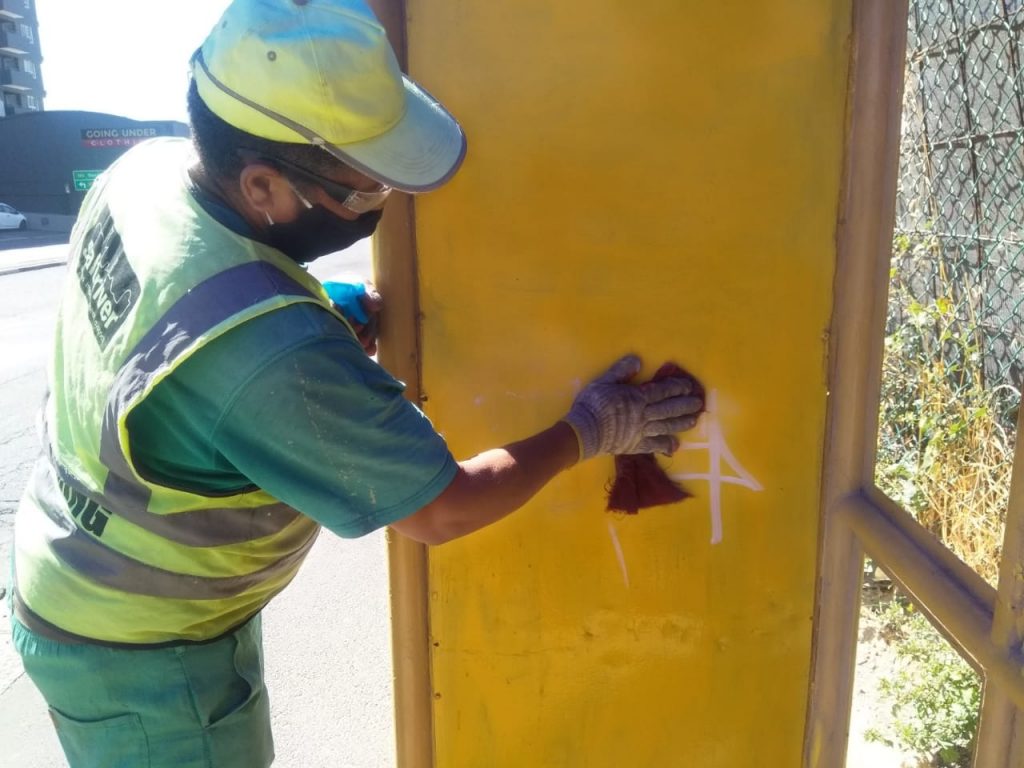
At the Salt River Business Improvement District, we are working alongside you to make a positive impact by:
- Keeping the streets clean of litter to make sure that your facade improvement remains clean and attractive to your new visitors.
- Removing all graffiti tags which aids in keeping your area safer by hindering criminal syndicates from targeting your business.
- Keeping the area free from posters on streetlights, road signs and boundaries such as fences.
As part of our urban community, you can help us by:
- Adding appropriate, well-designed custom signage to help employees and customers know where you are, where they should park and where they enter to stop them from passing your business by.
- Improving the aesthetic of your facade by adding lighting, resurfacing with cladding and paint, and adapting details such as decorative awnings, trims, and cornices.
- Rejuvenating architectural features on larger investments such as windows, entrances, and doorways.
- Improving the accessibility of your property with ramps, rails, wider doors, and sanitation stations that do not obstruct the flow of foot traffic.
Through the Facade Improvement Programme, we work tirelessly to protect your investment from being damaged and pride ourselves on providing swift and efficient intervention should a challenge arise. Ultimately, we want to help our community become a clean, healthy and safe place to work, live and thrive.
We would love to see what you are working on so please share your #goodnews!
You can contact us and share your story about how you are improving our area via info@srbid.co.za.
If you have any concerns to report, please contact one of the following numbers:
- SAPS (South African Police Services) 10111
- City of Cape Town Disaster Management- 107
- Geocentric Control Room – 021 565 0900
SALT RIVER BID AGM 2020
The Salt River Business Improvement District NPC (SRBID) will be hosting an AGM. All stakeholders are invited to a review of the year’s activities and planning for 2021/22.
Date: 27 October 2020
Time: 16h00
Venue: Conference Venue, Double Tree by Hilton Cape Town, Upper East Side, 31 Brickfield Road, Woodstock, 7935
Resolutions presented at the Members meeting can only be voted on by bona fide members of the SRBID (Membership List). This membership is available free of charge to all owners of non-residential property within the SRBID footprint, but they must be registered before 20 October 2020.
Please confirm your attendance by email to info@srbid.co.za to help us with seating arrangements. Due to current regulations the seating at the venue is limited and your response is important to reserve a seat.
DUE TO THE COVID-19 REGULATIONS ON PUBLIC MEETINGS WE WOULD LIKE TO URGE MEMBERS TO RESPOND AND BOOK YOUR SEAT FOR THE AGM.
IF A MEMBER CANNOT ATTEND THE AGM WE URGE YOU TO USE THE PROXY FORM AVAILABLE ON THE SALT RIVER BID WEBSITE – AGM PAGE TO PROVIDE FOR A REPRESENTATIVE OR MANDATE THE CHAIRPERSON BY PROXY TO REPRESENT YOU AS A MEMBER
WE NEED TO ENSURE WE HAVE A QUORUM FOR THE AGM
Please confirm your attendance / non-attendance by email to info@srbid.co.za
▪ Attendees need to print their own documents as prints will not be available at the meeting.
▪ The Minutes of the previous meeting, Annual Financial Statement will be displayed but not handled by attendees.
▪ All persons must have their hands sanitised on entering the venue.
▪ All attendees to wear a mask.
▪ Attendees must adhere to social distancing requirements during the meeting and if possible have one open chair between attendees.
▪ All attendees to bring their own pen for signing of the attendance register.
For further information, documentation and how to register, go to www.srbid.co.za or e-mail info@srbid.co.za or call 021 565 0901
City of Cape Town COVID-19 Business Impact Survey
Good day
At the start of lock down, the City of Cape Town engaged businesses across the City on the impact that the lockdown and the COVID-19 pandemic was having on their businesses. The inputs from that survey have been used to inform the City’s response to business support in the pandemic. The economy is now gradually re-opening and people are returning to work. This is not without its challenges. In order to continue to support businesses in this time, we are undertaking another survey.
The purpose of this survey is to gather information to determine the impact of the current COVID-19 virus pandemic on businesses operating in the Cape Town/Western Cape region with the aim of directing those in distress to suitable institutions for assistance. We would appreciate it if you could take ten minutes to complete the survey which can be found at the following web link:
https://forms.gle/pXe43oKALLH22sz37
The City of Cape Town will continue to support businesses in distress as we seek to minimize the economic impact of the pandemic. Two useful online resources that can assist business returning to work and looking for government and private sector support can be found at:
- Return2work initiative: templates, processes and requirements for businesses bring staff back into the workplace – https://www.return2work.co.za/
- COVID-19 Support Finder: assistance with identification of targeted support measures for business depending on their size and sector – https://supportbusiness.co.za/covid-19-support-finder/
If you have any queries regarding the survey or your business requires assistance please contact:
| Gerschwin Williams
Head: Investment Facilitation Unit (Atlantis) Gerschwin.Williams@capetown.gov.za Cell – 078 6733 997 |
Makeya Karlie
Professional Officer: Investment Facilitation Unit (Atlantis) Cell – 079 518 0406
|
Winston Richards
Professional Officer: Investment Facilitation Unit (Atlantis) Winston.Richards@capetown.gov.za Cell – 072 902 1691
|
Covid-19 – Essential services during nationwide lockdown
Strict regulations in place
Those on the road will be required to produce a permit and proof of identification to law enforcement officers
27 March 2020 – Cape Argus – BALDWIN NDABA AND MWANGI GITHAHU
ESSENTIAL services workers who will be allowed to report for work during the 21-day nationwide lockdown will do so under strict regulations.
Yesterday police emphasised that all people classified as essential workers would have to adhere to the regulations gazetted by Cooperative Governance and Traditional Affairs Minister Nkosazana Dlamini Zuma on Wednesday.
Each worker will be expected to carry a permit which they will have to present to law enforcement agencies during the execution of the lockdown.
According to the permit, under Regulation 118(3), “the person to whom this permit is issued must at all times present a form of identification to be presented together with this permit. If no identification is presented, the person to whom the permit is issued will have to return to his or her place of residence during the lockdown”.
Transport Minister Fikile Mbalula also announced that minibus taxis, metered taxis and e-hailing services would be limited to the public during the lockdown.
He said only staff rendering essential services and those out for essential purposes, such as buying groceries or going to work, would be allowed to leave home.
Taxis will only be allowed to transport people for these essential trips from 5am to 9am and 4pm to 8pm.
A vehicle licensed to carry up to four people will only be permitted to load one passenger. A vehicle licensed to carry up to eight passengers will only be permitted to load a maximum of three people.
Buses will also have limited operations – only transporting essential services workers and people making necessary trips.
Police Minister Bheki Cele also issued a warning to those who might want to transgress the regulations, saying law enforcement officers would act against them.
Gatherings would be banned, except for funerals, which could be attended by only 50 people or less.
Movement between provinces, metros and district areas would also be banned and roadblocks on the community, provincial and national roads would be conducted, to enforce this with health screenings to ensure movement was restricted.
With the SANDF possibly aiding the SAPS to police the lockdown, military sociologist Professor Lindy Heinecken of Stellenbosch University said sending in the army once again placed the military in a situation it might not be adequately prepared for.
“With just 10 companies (roughly 1400 soldiers), which implies less than 400 boots on the ground at any one time to allow for rotation, one wonders how much support they can render,” said Heinecken.
Meanwhile, Premier Alan Winde said staying home was the only way to save lives.
“I know what we are asking for is difficult, and it is scary, but we have overcome many, many challenges as a country. We can do it again, together. If we all do this, we will be able to go back to our lives again and start to rebuild our economy.
“If we do not, and the virus continues to spread, many people will die and the lockdown may be extended. So now is the time. We can do this together. Let us be strong now for each other,” said Winde.
He underlined that the lockdown meant: “You will be required to stay in your home unless it is to go and buy groceries, go to the pharmacy or to seek medical attention.”
He said that as of 9am yesterday morning, “the province had confirmed 181 positive cases of Covid-19. Three residents are currently in hospital as a result of this virus.”
Winde said they had put measures in place to assist victims of violence.
“Rendering services to victims of crime and violence is an essential service. The Western Cape Department of Social Development and civil society organisations will continue to provide these services through provision of shelters and psycho-social support.”
Winde said four shelters had been identified as Stage 1 shelters to admit at-risk victims of crime and violence.
“Only referrals from a social worker with safety risk assessment and SAPS referral will be accepted.
“After the initial 14 days, clients will be transferred from a Stage 1 shelter to a Stage 2 shelter with the assistance of the SAPS,” said Winde.
He said the Department of Health would assist with medical screening and the medical needs of clients.
Guide on how to Apply for a new, lost or stolen wheelie bin.
Apply for a new bin
The registered property owner or property managing agent must download and fill in the Supply of Services Application Form (English | Afrikaans | isiXhosa). Please ensure that you fill in all the sections related to refuse removal.
If you are renting, you will need to submit a letter of authority from the property owner or managing agent with your application form.
Click Here to guide.
Replace a stolen or damaged bin
If your bin has been stolen, you will need to report the theft of your bin at the nearest SAPS office to obtain an affidavit.
Click Here to guide.
NOTICE OF ANNUAL GENERAL MEETING – 2019
Notice is hereby given of the Annual General Meeting (AGM) of the Salt River Business Improvement District NPC that will take place on 22 October 2019, Conference Venue, Double Tree by Hilton Cape Town, Upper East Side, 31 Brickfield Road, Woodstock, 7935 at 16:00 where the following items will be discussed:
AGENDA
- Registration
- Welcome & Apologies
2.1 Membership
2.1.1 Resignations
2.1.2 New members
2.2 Quorum to constitute a meeting
- Previous AGM minutes
3.1 Approval
3.2 Matters arising
- Chairman’s Report
- Feedback on operations 2018-19
- Noting of Audited Financial Statements 2018-19
- Budget
7.1 Approval of use of additional surplus funds
7.2 Approval of budget 2020-21
- Approval of implementation plan 2020-21
- Appointment of auditors
- Confirmation of Company secretary
- Election of Board Members
- General / Q & A
- Adjournment
For more information please go to the AGM Page

